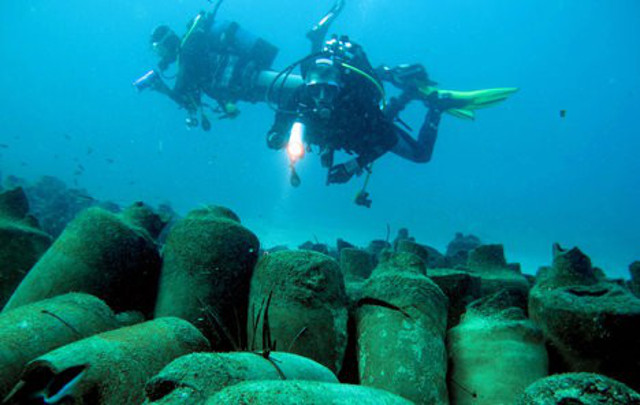Archaeologists have discovered an ancient Roman vessel laden with 3000 jars of delicious Roman fish sauce – or garum – on the seabed off the coast of Italy.
The find was presented on Thursday (Dec 10) by archaeologists, who spent almost two years searching for the 25-meter wreck in the deep blue waters five miles of the coast of Alassio, in the northeastern Liguria region.
"It's an exceptional find that dates to the first or second century AD," Dr. Simon Luca Trigona, who led the team, told The Local.
“It's one of just five 'deep sea' Roman vessels ever to be found in the Mediterranean and the first one to be found off the coast of Liguria. We know it was carrying a large cargo of garum when it sank."
The presence of an ancient vessel on the seabed was signalled to archaeologists in 2012, when local fishermen dredged up fragments of some clay jars that had been part of the vessel's payload 2000 years ago.

Image: Boris Horvat/AFP
In spite of the presence of a ship being known, locating the actual wreck was the result of a painstaking search. The Roman cargo ship was buried at a depth of 200 meters and underwater archaeologists spent two years scouring the seabed before they finally located it in October.
In spite of the mystery that usually surrounds ancient shipwrecks, it is almost certain that the ship was sailing a route between Italy, Spain and Portugal in order to transport a precious cargo of Roman garum. The clue lies in the shape of the clay jars, as the sauce itself has all since seeped into the sea.
"After we filmed the wreck and analyzed an amphora [clay jar] and some fragments that a robotic craft brought back to the surface, we realized the ship was carrying a huge quantity of fish sauce when it sank," said Trigona “The amphora are almost all of a certain type, which was used exclusively for garum."
Garum – a sauce made by fermenting salted fish intestines - was a mainstay of banqueting tables and street food stands across the Roman empire.
The sauce was highly prized for its nutritional qualities and was also a rich source of monosodium glutamate - a compound widely used in the food industry today as a flavour enhancer.
In addition to the fish sauce, archaeologists also identified two types of jar which were only manufactured in the area around the river Tiber in Rome. It is thought they were probably being used to transport some of the area's excellent regional wines to the Iberian peninsular.
"It's a nice find because it means we are almost sure about the route this ship was on," Trugona said. "She most likely sailed out of Rome along the Tiber and sank a couple of weeks later while making the return journey, weighed down by all that fish sauce."
For now, no further analysis of the wreck is planned and Trigona called for vigilance in order to protect the sunken cargo from would-be looters.
"At 200 meters nobody will be able to dive it but that won't stop people trying to pull things up using deep sea fishing nets."
Source: www.thelocal.it